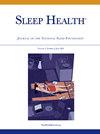Fathers’ sleep in the first 24 months postpartum: A systematic review and meta-analysis of global data
IF 3.4
2区 医学
Q2 CLINICAL NEUROLOGY
引用次数: 0
Abstract
Maternal sleep is significantly disrupted in the postpartum period, but changes in paternal sleep are less established. Here, we systematically review and meta-analyze available data on paternal sleep in the first 24 months post birth, including self-report and objectively measured sleep outcomes. Scopus, PsycINFO, and PubMed were searched for original research articles published until end August 2024. We included studies reporting on quantitative summaries of sleep outcomes and data were pooled using random-effects models primarily. We included 47 studies from 17 countries (N = 9684) with most data coming from fathers in North America (K = 26), and reporting on a diverse range of sleep outcomes. Most data were available for sleep duration (398.29 minutes; 95% CIs 381.43-415.88), night awakenings (1.14; 95% CIs 1.12-1.16), and wake after sleep onset (36.57 minutes; 95% CIs 20.83-64.20). There was high heterogeneity across these three measures (I2 values >95%). While there were a small number of studies using the Pittsburgh Sleep Quality Index, our pooled estimate suggested poor sleep in fathers (5.93, 95% CIs 4.75-7.41, I2 = 91%). Overall, we found some evidence for sleep in few fathers being below the recommended levels, but the extent of any paternal deficit depended on the sleep measure. The US-centric dataset limits our understanding of fathers’ sleep experiences postnatally, particularly considering the large relative differences between paternity leave access in the United States vs. other countries.
产后前24个月父亲的睡眠:全球数据的系统回顾和荟萃分析。
在产后期间,母亲的睡眠明显受到干扰,但父亲的睡眠变化则不那么明显。在这里,我们系统地回顾和荟萃分析了出生后前24个月父亲睡眠的可用数据,包括自我报告和客观测量的睡眠结果。Scopus、PsycINFO和PubMed检索了截止到2024年8月底发表的原创研究文章。我们纳入了报告睡眠结果定量总结的研究,数据主要使用随机效应模型汇总。我们纳入了来自17个国家的47项研究(N=9684),其中大部分数据来自北美的父亲(K=26),并报告了各种各样的睡眠结果。睡眠时间数据最多(398.29分钟;95% ci 381.43-415.88),夜间醒来(1.14;95% ci为1.12-1.16),入睡后醒来(36.57分钟;95% ci(20.83-64.20)。这三种测量方法存在高度异质性(I2值为95%)。虽然有少数研究使用匹兹堡睡眠质量指数,但我们的综合估计表明,父亲的睡眠质量较差(5.93,95% ci 4.75-7.41, I2=91%)。总的来说,我们发现一些证据表明,少数父亲的睡眠时间低于建议水平,但父亲睡眠不足的程度取决于睡眠测量。以美国为中心的数据集限制了我们对父亲产后睡眠经历的理解,特别是考虑到美国与其他国家的陪产假之间存在巨大的相对差异。
本文章由计算机程序翻译,如有差异,请以英文原文为准。
求助全文
约1分钟内获得全文
求助全文
来源期刊

Sleep Health
CLINICAL NEUROLOGY-
CiteScore
6.30
自引率
9.80%
发文量
114
审稿时长
54 days
期刊介绍:
Sleep Health Journal of the National Sleep Foundation is a multidisciplinary journal that explores sleep''s role in population health and elucidates the social science perspective on sleep and health. Aligned with the National Sleep Foundation''s global authoritative, evidence-based voice for sleep health, the journal serves as the foremost publication for manuscripts that advance the sleep health of all members of society.The scope of the journal extends across diverse sleep-related fields, including anthropology, education, health services research, human development, international health, law, mental health, nursing, nutrition, psychology, public health, public policy, fatigue management, transportation, social work, and sociology. The journal welcomes original research articles, review articles, brief reports, special articles, letters to the editor, editorials, and commentaries.
 求助内容:
求助内容: 应助结果提醒方式:
应助结果提醒方式:


